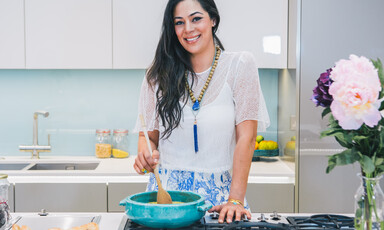
Palestinian cuisine is more than what’s on the plate
15 June 2017
Palestine On A Plate author Joudie Kalla talks food, memory and identity. Read more about Palestinian cuisine is more than what’s on the plate

15 June 2017
Palestine On A Plate author Joudie Kalla talks food, memory and identity. Read more about Palestinian cuisine is more than what’s on the plate

6 August 2010
Zionist sympathizers and their ilk have been providing us with the same “evidence” that Gaza is burgeoning: the markets are full of produce, fancy restaurants abound, there are pools and parks and malls … all is well in the most isolated place on earth — Gaza, the “prison camp” that is not. However, “prison camp” might be an understatement. Read more about Israel's siege on freedoms

United States 14 April 2009
“For this is what the Palestinian does: we wait. For an answer to be given, for a question to be asked … for exile to a better place and for return to the only place that knows us …” Laila El-Haddad writes about her deportation from Egypt while attempting to go home to Gaza. Read more about The quintessential Palestinian experience

Durham, United States 13 January 2009
I have a routine of sorts. I monitor the situation back home in Gaza all day — I keep Al Jazeera English on continuously as long as I am home, despite my son’s Yousuf’s nagging to switch to cartoons. He stopped asking several days ago, when, tearful and angry, I told him Gaza is being bombed, that Seedo and Tete (Grandma and Grandpa) are in danger. Laila El-Haddad writes from the US. Read more about The gates of Hell, the window to Heaven

Durham, United States 12 January 2009
I receive the dreaded 9pm call from my father. My heart skipped a beat — late night calls always bear bad news. “More bombings, I can’t sleep. Israeli navy gunships are bombarding Gaza City’s Tel al-Hawa neighborhood, you know where Amo Musab lives, where he built his new house,” he says, referring to his cousin. Laila El-Haddad writes from the US. Read more about We talk in silence, we stand together

Durham, United States 9 January 2009
“You don’t know anymore; you don’t know who is alive, you feel you are in a trap, you don’t know who is a target,” said my friend and neighbor in Gaza City, journalist Taghreed El-Khodary. The fear resonated in her voice while she was on the phone to Al-Jazeera. Taghreed lives on a street near my parents. “Where to? Where can I go seek refuge to?” she continued. Read more about Nowhere to hide from the bombing

Durham, United States 4 January 2009
My father and I made simultaneous back to back appearances on domestic CNN and CNN International last night. My father spoke calmly, eloquently, in the pitch dark of besieged Gaza, with only the the fire of Israeli bombs illuminating his world. “They are destroying everything that is beautiful and living,” he told the anchor. His hands were trembling, he confessed, as my mother and he lay on the floor of their home, where they moved their mattress far away from the windows. Laila El-Haddad writes from the US. Read more about Trapped, traumatized and terrorized

Durham, United States 30 December 2008
“There is a complete blackout in Gaza now. The streets are as still as death.” I am speaking to my father, Moussa el-Haddad, a retired physician who lives in Gaza City, on Skype, from Durham, North Carolina in the United States, where I have been since mid 2006 — the month Gaza’s borders were hermetically sealed by Israel, and the blockade of the occupied territory further enforced. Laila El-Haddad writes from the US. Read more about Bloodied in Gaza as the world silently watches

North Carolina 27 December 2008
We woke up this morning to the news in Gaza. It seems we always wake up to news there — so it has become a matter of perspective how bad the news is each time; how remote it seems each time; how real or not; how severe and whether the severity warrants an “international outcry” or whether the animals can continue to suffer in their cages for a while longer. Laila El-Haddad writes from the US. Read more about The rains of death in Gaza

2 March 2008
We celebrated Yousuf’s fourth birthday today. We ate cake. And we counted the bodies. We sang happy birthday. And my mother sobbed. We watched the fighter jets roar voraciously on our television screen, pounding street after street, then heard a train screech outside, and shuddered. Yousuf tore open his presents, and asked my mother to make a paper zanana, a drone, for him with origami; we were torn open from the inside, engulfed by a feeling of impotence and helplessness, fear and anger and grief, despondence and confusion. Laila El-Haddad writes on the “long-term” Gaza genocide. Read more about The Gaza genocide